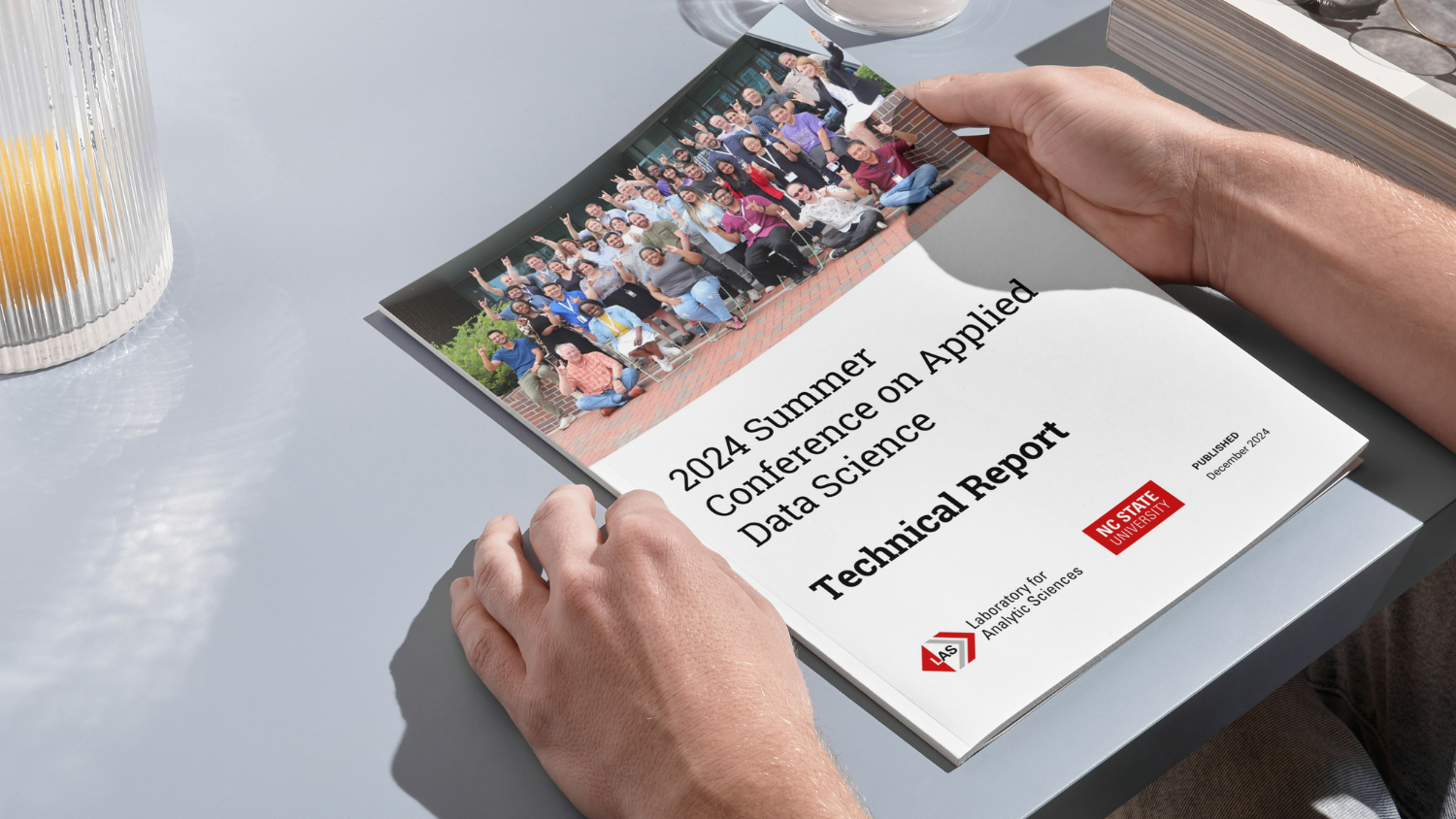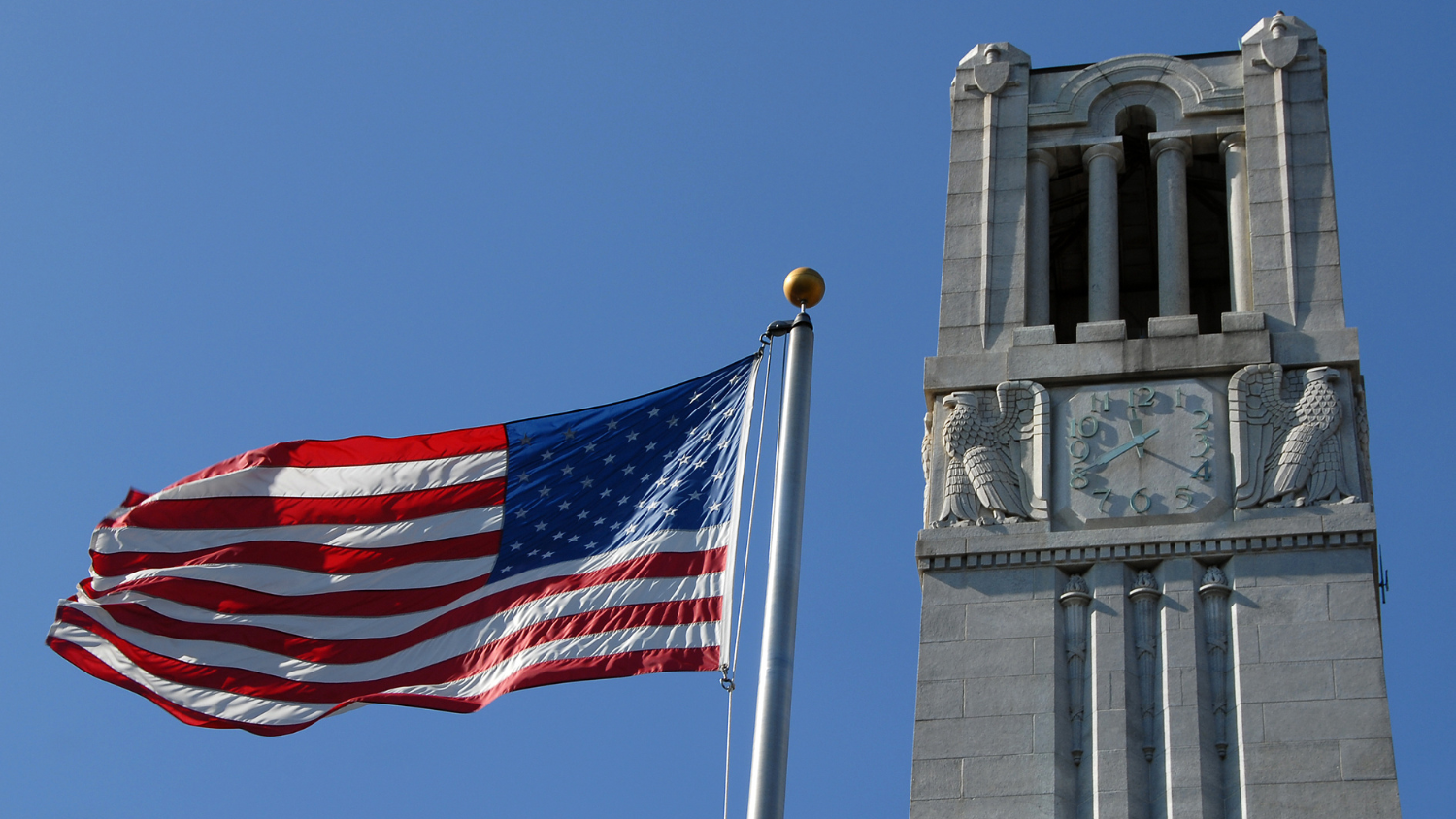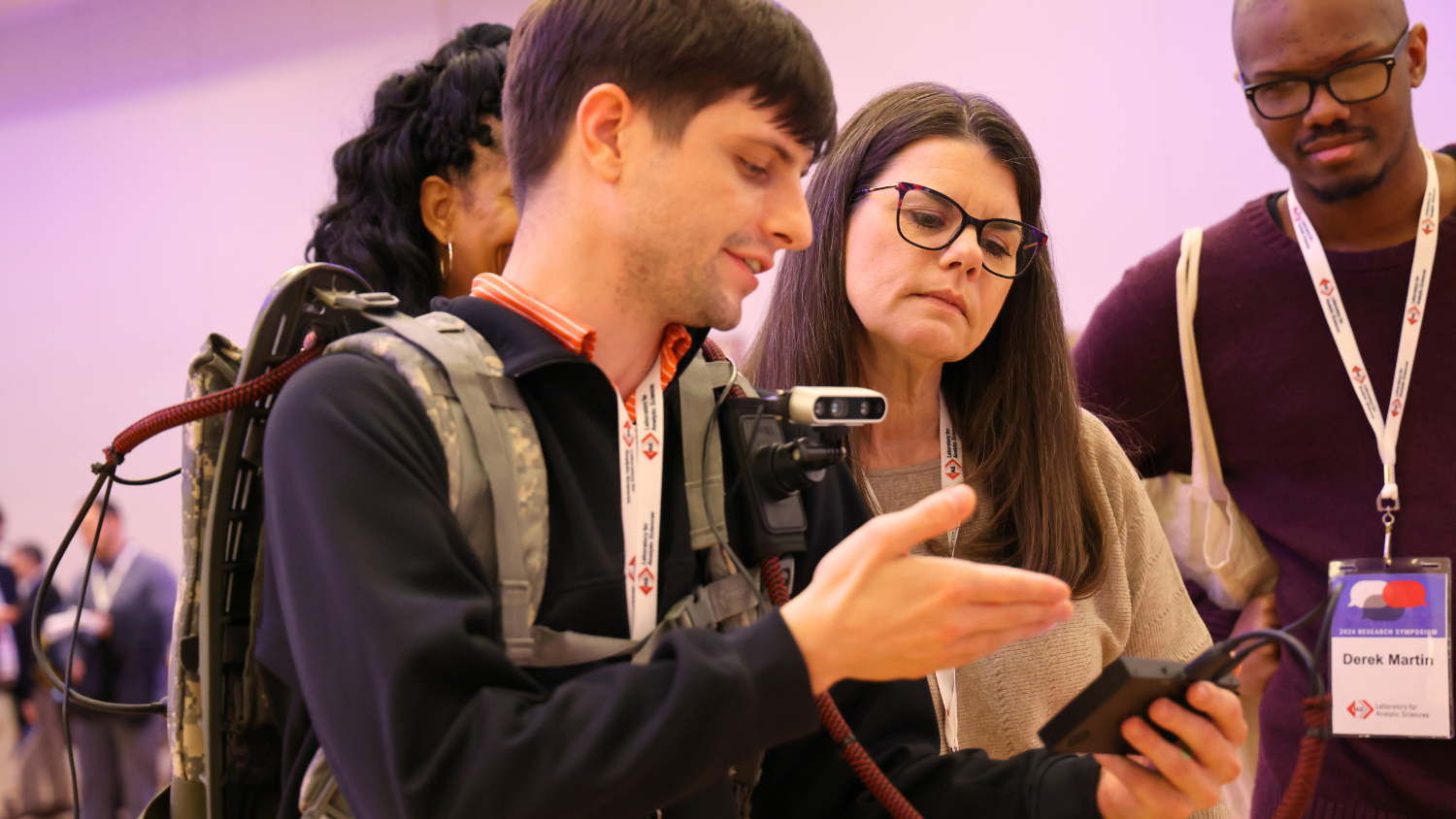Minority Serving Institution Outreach at LAS
Fayetteville State University Senior Design Projects
- Felecia Morgan-Lopez, James T. Smith III (Laboratory for Analytic Sciences)
- Dr. Sambit Bhattacharya (Fayetteville State University Computer Science Professor),
- Dr. Sharon Joines and Dr. Hongyang Liu (North Carolina State University Design Team)
The Objective
Develop a process at the Laboratory for Analytic Sciences (LAS) to collaborate with minority-serving institutions (MSIs) in North Carolina on research and development (R&D) projects, supporting one of NSA’s top priorities of building and sustaining a diverse, expert workforce that continues to provide the Nation with competitive advantages.
Partnering with MSIs allows subject matter experts from those institutions to work collaboratively on research projects and capabilities of significant size and impact to benefit the National Security Agency (NSA). These partnerships can help attract skill sets and untapped talent from diverse backgrounds and diversify the NSA workforce. The partnerships also enhance research infrastructure and expertise at MSIs and establish a foundation for continued engagement with NSA. Being in close proximity to many MSIs in North Carolina, the LAS team sought to strengthen NSA’s partnership with MSIs for the mutual benefit of MSIs and NSA mission customers.
Minority Serving Institutions (MSIs) include Alaska Native and Native Hawaiian Serving Institutions, Asian American and Native American Pacific Islander-Serving Institutions, Hispanic Serving Institutions, Historically Black Colleges and Universities, Predominantly Black Institutions, and Tribal Colleges and Universities. Figure 1 (below) displays the MSIs located in North Carolina, with the LAS centrally located in Raleigh.
Note that there are two MSIs in close proximity to military bases (i.e., the red boxes in Figure 1): Elizabeth City State University (Base Elizabeth City) and Fayetteville State University (Fort Bragg). This is key because those MSIs have a large military student population; in turn, much of their research is DoD focused.

The Academic Partnership

In the Fall of 2021, a partnership was formed between the LAS and the Computer Science Department at Fayetteville State University (FSU) to assist with developing a method to detect rare/uncommon objects in images. Located 15miles from the Fort Bragg military base (and 50 miles from the LAS), FSU is a state-funded Historically Black College and University (HBCU) with a large military student population.
Approximately 25% of FSU students are either active duty, veterans or have prior military experience.
The intent of the LAS and FSU partnership is to develop and leverage joint expertise in machine learning computer vision capabilities. This partnership was formed through NSA’s existing Educational Partnership Agreement (EPA) with the University of North Carolina (UNC) school system. Further, the LAS is seizing the opportunity to foster a continued relationship to address critical NSA challenges in support of NSA’s research, academic, and diversity priorities. The collaboration also provides an opportunity to recruit and possibly hire FSU students, especially those with military backgrounds, DoD experience, and/or clearances.

In collaboration with Dr. Sambit Bhattacharya, Professor of Computer Science at FSU, and the Computer Science Senior DesignSpring & Fall 2022 courses, the LAS team researched a concept to devise the first phase of a rendering engine that leverages Cycle Generative Adversarial Networks (GANs) to generate synthetic data on rare/uncommon objects to improve the robustness of computer vision models for object detection.
As an example of the collaboration with FSU, the LAS team devised a use case to synthetically generate Chinese-manufactured Closed-Circuit Televisions (CCTVs), which are deployed worldwide, to include being a part of the infrastructure in China’s Belt and Road Initiative throughout the Middle East. The LAS team along with co-advisor, Dr. Bhattacharya, provided weekly mentorship (virtual and in-person) to the students for the duration of both the Spring and Fall 2022 semesters.
To demonstrate the outcome of the first phase rendering engine, the FSU Spring 2022 senior design students and Dr. Bhattacharya were invited to the LAS to present their research on synthetic data generation to over 100 NSA attendees during the R6 weekly technical exchange. Additionally, the LAS team invited the Fall 2022 FSU students to their annual symposium to present the results of their research on GANs. Both of these avenues gave the senior design students the opportunity to showcase their talents on AI/ML, critical thinking, and applying advanced technological approaches to problem-solving, the development of a capability of immediate need to NSA.

Long-term Agreement

As a result of the collaboration between LAS and the FSU senior design class, the LAS team worked with the Office of Research and Technology Applications (ORTA) and FSU leadership to get the 5th MSI Cooperative Research and Development Agreement (CRADA) officially established as of May 2022. FSU will now have the opportunity to partner with NSA on research and development topics such as Internet-of-Things, Cyber Security, and Secure Composition and System Science.
Additionally, establishing the 5th MSI CRADA with FSU has allowed the students to participate in the semi-annual MSI CRADA Showcase hosted by ORTA. The showcase began in the Spring of 2022 and is continuing for the Fall of 2022. The goal is to give students from institutions with an MSI CRADA with NSA to work on research topics such as Quantum Computing, Trustworthy AI, Geospatial Computer Vision, and AI Integration. For eight weeks, mentorship and guidance from NSA and industry elements were given while the students worked on their research topics. The students will have a chance to present their work to a larger audience from NSA, academia, and industry by giving a 10-15 minute presentation about the problem and solution. This is another opportunity for the students to showcase their talents to various leaders within the government, industry, and academia, which could potentially lead to scholarships and job offers.
Success Story (Mutual Benefits)
The LAS/FSU partnership exposed the senior design students to real-world mission challenges, which allowed them to develop interests in continuing collaboration and/or employment opportunities with NSA.

- One student continued working with the LAS as a summer (2022) intern to research ways to automate synthetic data generation of rare objects using GANs
- Another student applied to the Computer Science Development Program (CDP) and multiple NSA technical positions.
- Two students applied to the NSA summer internship Computer Science program.
- One student applied for a summer internship vacancy in Language andAnalysis (Mandarin).
Additionally, the senior design projects provided the foundation for further collaboration between FSU and LAS. As such, FSU applied and was selected as a 2023 LAS performer continuing its research in computer vision. Also, this partnership resulted in the 5th MSI CRADA being established with FSU.
Finally, the LAS learned about FSU developing a Cybersecurity undergraduate curriculum. The LAS providedinformation about the Center of Academic Excellence in Cybersecurity (CAE-C) application process so FSU will have the opportunity to partner with NSA in the future on Cyber Defense, Cyber Research, and Cyber Operations.
This partnership with FSU demonstrates LAS’s capacity to provide boots-on-the-ground mentorship and guidance to other MSIs in North Carolina.
The Focused Discovery Activity
Informed by NSA’s MSI outreach process, the LAS collaborated with the NC State Design Team and NSA outreach elements such as the Office of Academic Engagement to document and refine an MSI outreach process for the LAS. A hybrid (virtual and in-person) Focused Discovery Activity (FDA) was developed and facilitated by the NC State Design Team, who has been a LAS performer for the past six years. Led by Dr. Sharon Joines and Dr. Hongyang Liu, the NC State Design Team’s research focus is applying design approaches to research. The objective of the FDA was to bring together stakeholders from multiple MSIs in North Carolina and NSA organizations to participate in structured activities and discussions that helped develop and document an outreach process for the LAS members to engage with faculty, staff, and students at MSIs.
During the FDA, a series of barriers and facilitators to outreach and engagement were identified from both the LAS’s and the MSI’s perspectives, particularly among MSIs that do not traditionally have strong ties to the NSA. For example, barriers from LAS’s perspective included a) having a limited understanding of the points of contact at MSIs for engagement and b) difficulties in post-engagement handoffs due to personnel turnover at MSIs. Barriers from the MSI perspective included a) hesitancy in working on NSA projects, and b) lack of clarity on how to engage NSA when there is initial interest.


After gathering information from both the LAS and MSIs about outreach and engagement, the NC State Design Team documented the phases of the outreach process as seen in Figure 4 (below). This flowchart can act as the initial roadmap on how the LAS conducts outreach to MSIs in North Carolina.

For more information on the FDA and its results, please visit the LAS 2022 poster/blog by the NC State Design Team called “Design Approaches to Research—Tools and Techniques (DARTT): Applications to LAS/IC Projects”.
Next Steps (FY23)
In 2023, the LAS team will partner with ORTA, the Office of Academic Engagement, and the Senior Data Science Authority to address the underrepresentation of women in the STEM and data science fields at NSA. North Carolina has three all-women institutions which are in close proximity to the LAS that currently have a STEM focus (i.e., Bennett College, Meredith College) or will have a focus in STEM in the near future (i.e., Salem College).
Similar to previous and current LAS/MSI partnerships in North Carolina, the LAS team will identify mission-based research projects on which faculty and students from all-women institutions will collaborate as part of undergraduate senior design projects. This field experience would then serve to build the pipeline of women STEM candidates from all-women institutions in order to facilitate the engagement and eventual recruitment of women in STEM fields to NSA and the IC-at-large.

Finally, the LAS will a) continue its partnership with FSU in 2023 as a LAS performer, refining our joint research on detecting rare/uncommon objects in images and b) continue to build relationships and explore R&D opportunities to promote untapped talent at MSIs in North Carolina.
Contact Information
For more information about the MSI outreach process at the LAS, please contact the LAS Government team below.
- Felecia Morgan-Lopez (fdvega@ncsu.edu)
- James Smith (jtsmit23@ncsu.edu)
- Categories:


